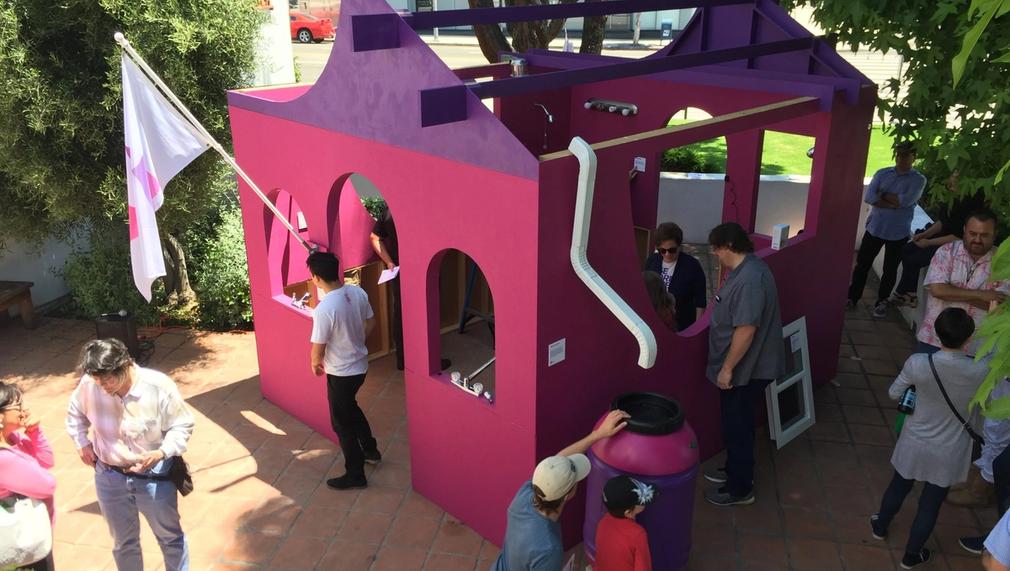Magenta House
Magenta House provides project-centered learning for middle school students, giving them the tools they need to create the future they hope to inhabit. The program engages them in developing innovative water and power sustainability solutions for real-world challenges where they apply STEAM knowledge and learn project development skills. Student teams flag their work “Magenta” to signal a different kind of future – one that’s water-wise and power-conscious.

What is the primary issue area that your application will impact?
K-12 STEAM education
In what stage of innovation is this project, program, or initiative?
Expand existing project, program, or initiative (expanding and continuing ongoing, successful work)
What is your understanding of the issue that you are seeking to address?
When environmental and social problems become overwhelming, hope is threatened along with a spirit of can-do optimism.
In response, education should empower youth, teaching knowledge and skills that can contribute to the common good. But where knowledge is siloed and learning passive, the empowering role of education withers, abstracted from real-world experience. Educational goals may be perceived as misaligned with a future students want to inhabit. Researchers report that almost 70% of students feel bored in school and 60% do not see value in what they are learning. In this environment, civic engagement itself can seem anachronistic.
In contrast, project-driven learning crosses the barriers of academic disciplines to develop real-world solutions to the problems we face. STEAM knowledge within the context of project-based skills are far from irrelevant but deeply motivating and empowering.
Describe the project, program, or initiative this grant will support to address the issue.
Magenta House is a transdisciplinary, project-based program that connects learning with civic engagement. It fosters self-efficacy and joy for education, integrating formal subjects found in STEAM with non-academic skill development such as social entrepreneurship. It grounds an environment of hope in positive action. Magenta House unites a science fair-like showcase of civic engagement solutions for water and power sustainability with a full service accelerator program to help students do their best work, and includes: Magenta House Accelerator: offering a suite of LAUSD-tested project development tools and support, the Accelerator includes curricular resources, with teacher and student guides; five lesson plans covering history of water and power in LA, creative brainstorming, project management, impact assessment, and presentation design; a project management system to help students track projects; a mentorship program (includes narrative construction and project pitching), and stipends for project development.
The Magenta House Expo: a showcase event with a panel of judges, awards, prizes, and the opportunity to celebrate and share their projects with the broader community. Comprehensive learning resources: these include additional worksheets and homework assignments to compliment lesson plans, and a dedicated website (MagentaHouse.org) with comprehensive learning resources that serves as a hub of Magenta House activity.
Describe how Los Angeles County will be different if your work is successful.
Magenta House offers an educational program that creates an environment of can-do spirit for youth that’s focused on matters of great social and environmental importance for the place they call home. We expect to double enrollment from last year to 40-50 classes; involving 30-45 teachers and administrators; supporting some 150 project teams; expecting a total involvement of some 600 students representing approx. 20,000 hours of learning time. Last year, one school created a now-annual clothes recycling program; some students created actual businesses, saving water and donating extra money to help the homeless; other students even made their own bioplastics at home. The program will impact LA by transforming schools into incubators for engaged youth. Success is lighting the spark in students like those above making real, lasting impacts in their communities to permanently affect their education and commitment to social and environmental change in a positive way.
What evidence do you have that this project, program, or initiative is or will be successful, and how will you define and measure success?
Quantitative assessment includes: number and diversity of participating schools and students; number of student hours in the program; and the percentage of returning participants. Qualitative assessment includes quality of student projects and surveyed comments from participants and community members.
As a result of our initial program year, students and teachers spent over 9,000 hours on our educational goals. Over 300 students participated, accelerating 25 projects. Increasing both the number of classes and schools committed to Magenta House and the number of high-quality, legacy projects such as those above will be the main targets for continued success. Already, multiple projects are slated to continue at their school, continuing their positive impact after the end of the program, and, prior to opening enrollment and conducting outreach, almost 75% of participants expressed wanting to join Magenta House 2024/25 with two new schools having contacted us as well.
Approximately how many people will be impacted by this project, program, or initiative?
Direct Impact: 650.0
Indirect Impact: 40,000.0